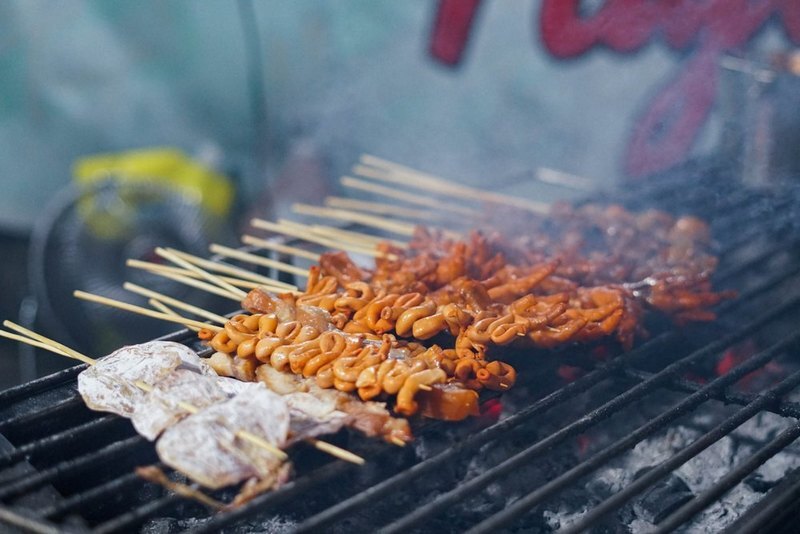[dropcap size=big]T[/dropcap]here would be sisig.
There would be sinigang.
And there would be Shaggy.
At least, this was the expectation of dozens of ticket-holders to FAHMFest, a two-day celebration of Filipino culture promising over 50 food vendors and multiple musical acts over the October 16 to 17 weekend in San Pedro.
Instead, attendees arrived only to find an empty parking lot and significant disappointment, with the festival and its website seemingly zapped off the face of the earth without warning.
“At least they got sandwiches at Fyre,” Arcadia resident Bobby Hermoso told Asian Journal, comparing the catastrophe to Billy McFarland and Jah Rule’s infamous 2017 flop in Great Exuma.
Filipino American History Month is commemorated by numerous communities in October, timed to honor the first recorded arrival of Filipinos to the country we now call the United States of America. Over 100 years before the Mayflower stuck its bow into this land’s business, a crew of Filipino sailors arrived in Morro Bay on Oct. 18, 1587, upon a Spanish galleon.
Today, in a year marked by increased attacks and hate crimes against varied Asian communities, a cultural festival such as the one FAHM promised takes on increased importance, as a chance to put Filipino-Americans in touch with their cultures while providing greater context for those outside of it.
The San Pedro event seemed like it would have it all. “We want our community to have a platform to perform and we want to highlight our culture,” FAHMfest co-founder Lulu Williams told Daily Breeze back in May.
Almost two dozen musical performances were promised on two stages by Williams and partner Joshua Castillo, including Shaggy, who ultimately must have decided “It Isn’t Me,” along with acts such as Rudy Ibarra, rapper P-Lo, Spawnbreezie, and the Beat Junkies’ DJ Icey Ice.
Food vendors dangled before FAHMfest’s $20 to $250 ticket holders included Satay LA and Petite Peso, among an assured abundance of Asian eats familiar to Angelenos, including vendors of Filipino, Hawaiian, Korean, and Chinese cuisine.
The “immersive” festival also assured attendees there would be “music, art, dance, and fashion.” Simultaneously, FAHM suggested that a portion of proceeds would be going to help Filipino nurses, while also attempting to sell existing ticketholders on upgrades.
Sadly, it was all talk and no kare-kare variations of any kind were to be enjoyed.
Instead, guests arrived from near and far early on October 16 to find that the heavy load of hype and marketing had resulted in nothing but an empty lot full of similarly pissed-off people, without so much as a whisper of the festival to be found. No updates or cancellations had seemingly been sent by the organizers of the “immersive” event, who had taken their website down and scrubbed the internet of their existence.
A refund and cancellation notice wasn’t received until later that afternoon, sent by Fever, which sold tickets as a third-party connect for the fictional festival. The apology thankfully included refunds.
Aggravated sleuths later discovered an August message buried online by FAHM organizers Big Time Affairs announcing the event’s postponement. A source tells Asia Journal that the company behind the event has since filed for Chapter 11 and that the event will not be resuscitated.
The clear lack of communication, as well as the deletion of organizers’ social media and the event website itself, has naturally led many to believe the event was a scam from the jump. Most would-be attendees agree that FAHM exploited Filipino culture and heritage for the organizers’ own benefit, leaving many crestfallen visitors to fill the void with stops at their favorite Filipino restaurants and commiseration with other guests given the runaround.
Here’s hoping there’s quick restitution to all who were bilked by FAHMFest.
And if you’re still looking to connect with Filipino culture, consider staying up to date with trusted organizations that are currently celebrating Fil-Am History Month, such as the non-profit FilAm Arts Organization, which is scheduling both cultural events and fundraisers throughout October and beyond.
Los Angeles is expectedly full of great places to eat Filipino cuisine, from Big Boi on the Westside and Ninong in the San Fernando Valley, to Pinoy barbecue at The Park’s Finest in Echo Park, Petite Peso and Sari-Sari Store in Downtown, and Tagalog Takeover and Arko Foods in L.A.'s northeast, among the many.
And of course, if you’re ever seeking a great longaniza-topped pizza or sisig taco in L.A., you know we’ve got you.
As for tracking Shaggy down, you’re on your own.
Via Asian Journal: 'A Disgrace to Our Community:' Fil-Ams lament the failed San Pedro Filipino Festival that promised so much but delivered nothing - literally.







